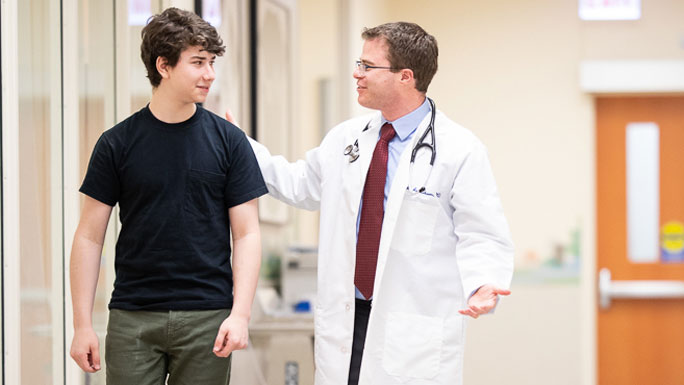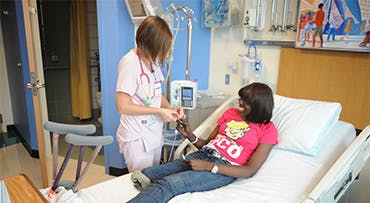Pediatric Osteosarcoma

What is Pediatric Osteosarcoma?
Osteosarcoma (also known as osteogenic sarcoma) is a tumor that is most often seen in children and almost always occurs in a bone, most commonly near the growth plates around the knee, arms, legs and pelvis. It is the most common type of pediatric bone tumor. Osteosarcoma occurs more frequently in males than in females and usually affects adolescents and young adults between the ages of 10 and 25. Like all sarcomas, the tumor is highly malignant and can metastasize (spread) rapidly to other bones and to the lungs. Accurate diagnosis and staging, and prompt, carefully orchestrated therapy are particularly critical when treating osteosarcoma.
Why Choose UChicago Medicine Comer Children's Hospital for Osteosarcoma?
The University of Chicago Medicine Comer Children’s Hospital has a multidisciplinary team of experts with the experience and advanced resources to diagnose, analyze and treat osteosarcoma and other less common types of bone sarcomas. Pediatric oncologists, radiation oncologists, orthopaedic surgeons, pathologists, nurse specialists and others at Comer Children’s work together as a team to strive for the best results for children with bone sarcomas.
Symptoms of Osteosarcoma
The most common symptoms of osteosarcoma are:
- Sharp or dull pain at the site of the tumor
- Swelling and/or redness at the site of the tumor
- Increased pain with activity or lifting
- Limping
- Decreased movement of the affected limb
Pain and swelling in arms and legs are not uncommon in teens and young adults, especially young athletes. When the pain and/or swelling persists, gets worse at night or during exercise, or begins to interfere with activity, a doctor should be consulted.
Diagnosing Osteosarcoma
Getting the correct diagnosis is critical, but isn’t always simple. Multilevel, advanced diagnostics are necessary to detect, locate, identify and stage osteosarcoma. Once a tumor is suspected, your care team will perform state-of-the art imaging studies and procedures including:
- X-ray to confirm the presence of a tumor
- Magnetic Resonance Imaging (MRI) or Computed Tomography (CT) scan to determine the extent of the tumor
- Bone scan to identify any additional sites of bone involvement
- Positron Emission Tomography (PET) scan to find small tumors or check if treatment is working effectively
- Biopsy to remove tissue from the tumor for microscopic examination by an expert pathologist
Using extensive, specialized testing of the tissue, the pathologist is able to confirm the diagnosis and identify the type of sarcoma. The sarcoma team then assigns a stage to the tumor, defining whether the tumor is localized to only one site or has spread to other sites. Having the correct diagnosis and stage assignment is critical for optimal treatment planning.
Treating Osteosarcoma
There are several steps in the treatment of osteosarcoma. Most patients with osteosarcoma need to be treated with chemotherapy first. Even if the cancer appears to be localized to one place, we know that microscopic amounts of osteosarcoma cells may have spread around the body but are not detectable. Second, effective osteosarcoma therapy nearly always includes surgery to remove all visible tumor. Usually, our osteosarcoma team uses chemotherapy to shrink the tumor before surgery. This is done to have a better chance of removing the tumor without significantly interfering with function or needing an amputation.
Chemotherapy is often used again after surgery to destroy any remaining cancer cells where the primary tumor had been and in other sites as mentioned above. If complete removal of the tumor is not possible or if we can still detect cancer in the tissue surrounding the tumor site after the surgery, radiation may also be necessary. At Comer Children's, we have the capability to provide all of these treatment options on-site, which enables the team to effectively coordinate each child's care and to readily modify treatment plans as the cancer responds to therapy.
Some patients may be eligible for studies of the very newest therapies through clinical trials being conducted at Comer Children's. Parents are closely involved in deciding whether or not to enroll their child in a clinical trial. Clinical trials are only considered by the sarcoma team if they are thought to provide the best chance to cure the osteosarcoma.
Frequently Asked Questions About Osteosarcoma
What causes osteosarcoma?
Although osteosarcoma is not completely understood, we know it occurs when there is uncontrolled dividing among bone cells. It is associated with genetic mutations in the cells that form the bones. Most often, osteosarcoma is diagnosed during adolescence, when the bones are growing the most. The reason for this association is not clear; it is possible that growing bone cells are more likely to become “transformed” into cancerous osteosarcoma cells.
What are the risk factors for osteosarcoma?
Most of the time, we do not know why osteosarcoma develops in an individual child. However, osteosarcoma has been linked to certain hereditary conditions in which children are at an increased risk for developing the disease. Osteosarcoma has also been linked to previous radiation therapy given earlier in life for other types of cancer.
Do I have to worry that my other children will get osteosarcoma?
It’s very rare for other family members to be affected. We always analyze family history for each new patient. Occasionally a genetic problem is suspected. In that case, the patient and certain family members are sometimes referred to our Pediatric Familial Cancer Center to be tested for inherited defects that might predispose them to cancer.
What is staging?
Once the diagnosis has been confirmed, your oncologist will assign a stage to the tumor based on how advanced it is. Osteosarcomas are staged as either localized or metastatic (spread to other parts of the body — typically to the lungs).
Where does osteosarcoma usually spread?
If the tumor cells have metastasized they are most often found in the lungs, in other bones, or both.
Will my child need surgery?
Osteosarcoma requires surgery for the initial biopsy and for removal of all visible tumor tissue. This is often accomplished using bone grafts, limb-sparing procedures and reconstruction. Only rarely is amputation required. In the past, amputation of the involved limb was the first line of treatment for tumor removal. At Comer Children’s, our orthopaedic surgeons and sarcoma team avoid amputation whenever possible. In fact, in the 1980s, UChicago Medicine was among the first institutions in the U.S. to perform limb-sparing surgery. We continue to be innovators in using surgical techniques that remove cancerous bone and tissue while leaving as much of the child's healthy bone and tissue intact as possible.
Will my child need chemotherapy? If so, how is it given?
Chemotherapy, before and after surgery, is a critical part of the comprehensive and multidimensional treatment of osteosarcoma. It is given before surgery in order to shrink the tumor, and in an attempt to prevent or control the spread of the tumor. Chemotherapy after surgery targets potential tumor sites not removed completely by surgery. It is important to know that chemotherapy is nearly always needed even if the osteosarcoma is only visible at one site and can be removed. In the past, when osteosarcoma was only treated with surgery, it often came back and was even harder to eradicate. Chemotherapy is usually given intravenously (IV) through a temporary central line. Other medications that control the side effects of chemotherapy are given orally.
Will my child need radiation treatment?
Because osteosarcoma cells are not easily killed by radiation, it is not typically used in the initial treatment phase. But, if complete removal of the tumor is not possible or if there is still visible cancer in the tissue surrounding the tumor site after the surgery, radiation may be necessary.
How long will treatment take? How long will my child be in the hospital?
The length of stay will vary from patient to patient. In general, the first phase of treatment lasts 10 to 15 weeks, during which time chemotherapy is given to begin to shrink the tumor. During this phase, you should anticipate being in the hospital only for periods of three to five days every three weeks when the chemotherapy is actually administered. Surgery typically takes place immediately following this first chemotherapy phase and requires some inpatient stay. After surgery, treatment continues for about 18 more weeks, with inpatient stays lasting a few days every few weeks to administer the chemotherapy.
What are the side effects of treatment?
Chemotherapy drugs not only attack the cancer cells, they can injure normal tissue and blood-forming cells. For this reason, your child may experience some of the common side effects of chemotherapy including low blood counts (causing anemia), nausea, vomiting, hair loss, mouth sores, irregular periods (girls) and inability to produce sperm (boys). Your treatment team will do everything they can to reduce or prevent side effects of treatment.
Does treatment cause infertility?
You and your child should talk to your doctor about the reproductive risks associated with cancer treatment. In certain situations, there are options available to try to preserve fertility, such as with sperm banking. These programs are available at Comer Children’s.
At Comer Children's, we carefully balance the need to surgically treat bone cancer with the desire to keep kids active and functioning normally throughout their childhood and into adulthood. There are different types of surgery required during treatment for osteosarcoma. Surgeries are tailored to fit the needs of each patient:
- Resection: Removal of the original tumor
- Limb-sparing surgery: Removal of the affected bone, saving the limb from amputation. This is done in most cases.
- Articular-sparing surgery: Removal of the tumor and reconstructing the bone/limb while preserving the joints.
- Amputations: Removal of all or part of the limb. It is rarely done and used as a last resort, when it is the only option for cure.
- Metastases surgery: Removal of tumor that has spread to other places, usually to the lungs
Orthopaedic surgeons at Comer Children's have been leaders in less-extreme surgical treatment of bone cancers for more than 20 years. In the 1980s, our surgeons were among the first in the U.S. to perform limb-sparing surgery as an alternative to amputation. We use state-of-the-art prostheses to rebuild the involved cancerous bone or joint removed during surgery. With physical therapy, nearly all patients are able to walk soon after surgery.
Today, our surgeons are among the first worldwide performing "articular-sparing" (joint -sparing) resection to preserve the joint surfaces and long-term functioning for kids with bone cancer. This intricate technique preserves as much of the child's healthy bone as possible. In certain scenarios, they are also able to spare the growth plates, preserving bone growth as the child grows. Like matching together pieces of a jigsaw puzzle, the orthopaedic surgeon removes cancerous bone and then fits together the child's own healthy bone with bone from a bone tissue bank (i.e. allograft bone). The result: a bone or joint that is strong, stable and has the best chance to grow normally.
What is the prognosis for survival?
The prognosis for survival varies depending on the stage of the tumor when it is detected and treated and other factors. The survival rate for osteosarcoma patients who undergo chemotherapy and surgery, and who have no metastases, is approximately 70 percent. Survival rates for patients whose cancer has spread to the lungs or other bones are 30 to 50 percent, if the affected tissues are successfully removed.
Can osteosarcoma come back?
Unfortunately, osteosarcoma can come back after treatment. The lungs are the most common sites for recurrence. Sometimes, multiple resections (partial surgical removals) of recurrent tumors are necessary. Additional chemotherapy or experimental therapy is recommended in some cases.
Our Pediatric Cancer Locations in Chicago and Merrillville
Request an Appointment
To speak to someone directly, please call 773-702-6169. If you have symptoms of an urgent nature, please call your doctor or go to the emergency room immediately.
For Referring Physicians
To refer a pediatric patient for cancer care, please call UCM Physician Connect at 1-800-824-2282.
* Indicates required field



